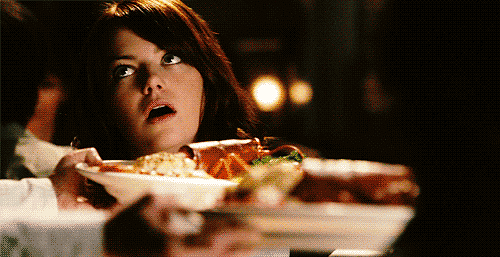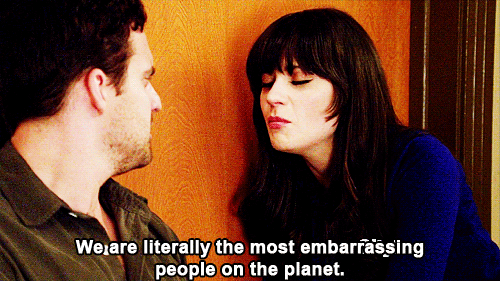-

GIF courtesy of gifs.tastefullyoffenisve.com

GIF courtesy of gifs.tastefullyoffenisve.com
The word vegetarian basically has the word veggie in it, so a big bowl of lettuce, carrots, tomatoes, broccoli, and mushrooms must naturally serve as a satisfying dinner, right? Sure, if you want to be hungry again in about ten minutes and proceed to eat your entire kitchen.
8. Vegan beef is actually a thing.

GIF courtesy of fscinteractive.com
It looks like beef. It has the texture of beef. It (kind of) tastes like beef. But it’s actually a plant-based soy protein, and when it’s mixed in with veggies and guacamole inside a tomato-basil tortilla in the dining hall, you can barely tell the difference.
9. Eating out becomes a daunting, difficult task.

Gif courtesy of popsugar.com
Going out to eat immediately ensues fits of anxiety, quickly followed by intense feelings of disappointment and regret after realizing that the restaurant of choice is not vegetarian friendly. Half-heartedly settling for a haphazard combination of french fries, mozzarella sticks, or mashed potatoes as a meal becomes more common than not, and intently reading a menu multiple times evolves into a normal practice, because, you know, if I didn’t see a veggie burger on the second page the first time, it will magically appear the third or fourth time around, right?
10. Asking for no chicken on a chicken salad is really awkward.

Gif courtesy of teen.com
Asking for no onions on a sandwich or no mustard on a hot dog is generally a common request. The server would most likely nod his or her head as they scribble a note on their note pad, but God forbid you ask them to hold the chicken on a chicken salad. Instead of just abiding by your odd request, you get the judgmental eyebrow raise followed by your face reddening with embarrassment as you attempt to explain yourself with jumbled thoughts and equally jumbled words. Awk.
11. Converting to vegetarianism can be one of the most rewarding lifestyle changes you can make.

GIF courtesy of gemini-dragon-gifs.tumblr.com
After you battle through the initial transition period, and after standing strong despite difficulties and roadblocks, you won’t miss the meat or regret a thing. I can vouch first hand for how much healthier I feel both physically and mentally, and I wouldn’t change that for anything.
Upon being raised in a very passionate Italian household, my childhood was built on a hearty foundation of three meat and seven cheese lasagnas, vats of Italian sausage simmering in meat sauce and pans upon pans of veal and chicken Parmigiana alike. With that being said, I’m sure you could imagine how dramatic it was three months ago when I told my family—including my exuberant Italian grandfather—of my desire to convert to vegetarianism.

GIF courtesy of warnerbros.com
For you non-vegetarians out there, it can be noted that individuals convert to plant-based diets for different reasons. Some utilize it as a weight loss plan, others are actually allergic to meat, and some use it as a campaign for animal’s rights. I personally fall under the last category; call me a hippie if you want. On top of my carnivorous childhood, I also grew up on stories like Charlotte’s Web and I guess my sympathy towards Wilbur only increasingly swelled rather than faded away as I matured into young adulthood.
Nonetheless, after answering countless questions like “Will you still eat fish?”, “Does this mean you’re not going to eat Thanksgiving turkey?”, “Do eggs count as meat?” and my personal favorite “You aren’t going to go all vegan on us, are you?” about one hundred times each, followed by a handful of morality debates, my family finally accepted my decision of becoming an herbivore.

GIF courtesy of peculiargroove.tumblr.com
After conducting extensive research on my new diet, I thought that I knew all that I needed to know. I had convinced myself that I knew what I was getting myself into. But…I was wrong. Some things can only be learned through time.
1. People always assume that you’re a radical animal rights activist.

GIF courtesy of dreamerbot.tumblr.com
Yes, my motive for becoming vegetarian was the realization that I valued animals’ lives more than my craving for meat and poultry. That is indeed true. This does not mean, however, that I’m going to picket graphic images of slaughterhouses outside of a McDonald’s or boycott a chicken nugget factory.
2. Carnivores easily become excessively aggressive.

GIF courtesy of tumblir.com
Politely declining a hamburger or slice of prime rib can result in a series of harsh accusations or getting interrogated with a barrage of intensive questions. No, I’m not vegetarian because I think I’m better than anyone else. It’s actually been quite a humbling experience.
3. Multivitamins are actually really important.

GIF courtesy of realitytvgifs.tumblr.com
Unbeknownst to my previous knowledge, some vitamins aren’t commonly found in fruits, vegetables, and beans (like vitamins B-12 and D) so taking a multivitamin to cover the bases is essential. On the plus side, they come in various fruit-flavored gummies, so that’s pretty sweet.
4. Your transition diet will consist of carbs, carbs, a little protein, and more carbs.

GIF courtesy of whatgiftoday.tumblr.com
Initially I neglected to replace the meat and poultry I wasn’t eating with another substantial protein source. Instead I just sought out safe, meatless go-to’s like breads, crackers, pretzels, and cereals, with the occasional cheese stick or yogurt cup. AKA lots and lots of carbs accompanied by an insignificant amount of protein, resulting in a famishing hunger occurring approximately every 30 seconds.
5. You will never look at beans the same way again.

GIF courtesy of carlygoogles.blogspot.com
One of the easiest and simplest sources of protein for new-coming vegetarians are beans. The initial pride of finally eating a substantial amount of protein soon wears off after you find yourself eating a variation of black beans for breakfast, lunch, and dinner, which leads to eventually being repulsed by every single bean in existence.
6. Eating eggs is essentially the same thing as eating a chicken.

GIF courtesy of reddit.com
When advertising yourself as a vegetarian, you’ll often be asked if you’re planning to “take the next step” and become vegan. I have no intention of being vegan, however eating eggs while claiming to not consume poultry is a bit hypocritical due to the fact that a plate of scrambled eggs is debatably an aborted chick.
7. Salads don’t keep you full. EVER.
-

GIF courtesy of gifs.tastefullyoffenisve.com

GIF courtesy of gifs.tastefullyoffenisve.com
The word vegetarian basically has the word veggie in it, so a big bowl of lettuce, carrots, tomatoes, broccoli, and mushrooms must naturally serve as a satisfying dinner, right? Sure, if you want to be hungry again in about ten minutes and proceed to eat your entire kitchen.
8. Vegan beef is actually a thing.

GIF courtesy of fscinteractive.com
It looks like beef. It has the texture of beef. It (kind of) tastes like beef. But it’s actually a plant-based soy protein, and when it’s mixed in with veggies and guacamole inside a tomato-basil tortilla in the dining hall, you can barely tell the difference.
9. Eating out becomes a daunting, difficult task.

Gif courtesy of popsugar.com
Going out to eat immediately ensues fits of anxiety, quickly followed by intense feelings of disappointment and regret after realizing that the restaurant of choice is not vegetarian friendly. Half-heartedly settling for a haphazard combination of french fries, mozzarella sticks, or mashed potatoes as a meal becomes more common than not, and intently reading a menu multiple times evolves into a normal practice, because, you know, if I didn’t see a veggie burger on the second page the first time, it will magically appear the third or fourth time around, right?
10. Asking for no chicken on a chicken salad is really awkward.

Gif courtesy of teen.com
Asking for no onions on a sandwich or no mustard on a hot dog is generally a common request. The server would most likely nod his or her head as they scribble a note on their note pad, but God forbid you ask them to hold the chicken on a chicken salad. Instead of just abiding by your odd request, you get the judgmental eyebrow raise followed by your face reddening with embarrassment as you attempt to explain yourself with jumbled thoughts and equally jumbled words. Awk.
11. Converting to vegetarianism can be one of the most rewarding lifestyle changes you can make.

GIF courtesy of gemini-dragon-gifs.tumblr.com
After you battle through the initial transition period, and after standing strong despite difficulties and roadblocks, you won’t miss the meat or regret a thing. I can vouch first hand for how much healthier I feel both physically and mentally, and I wouldn’t change that for anything.


